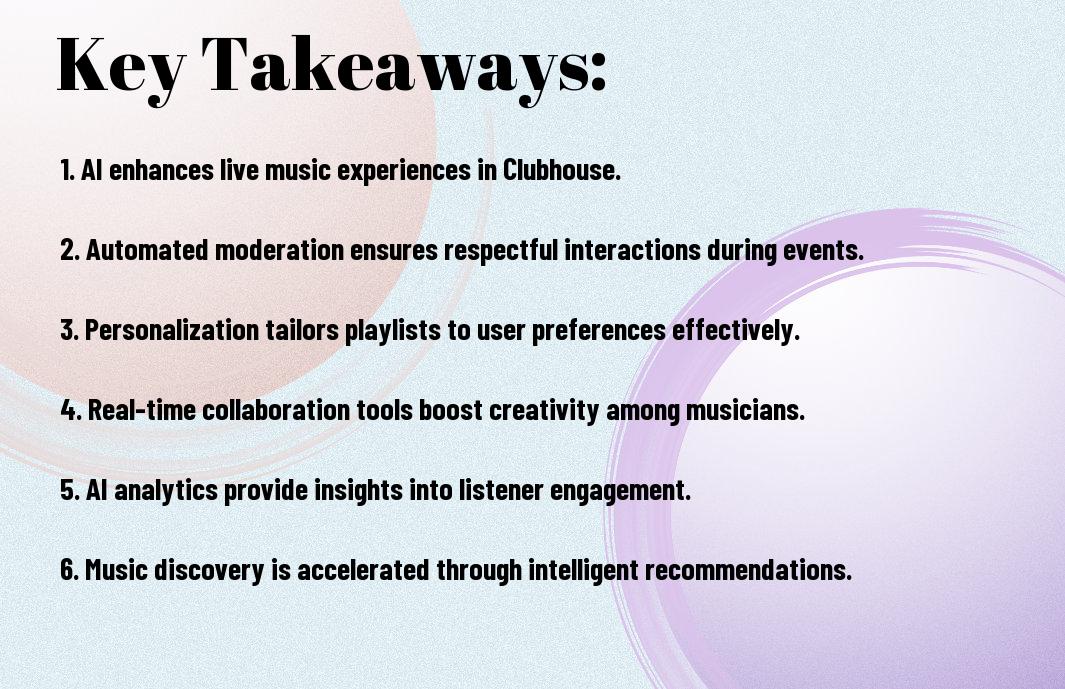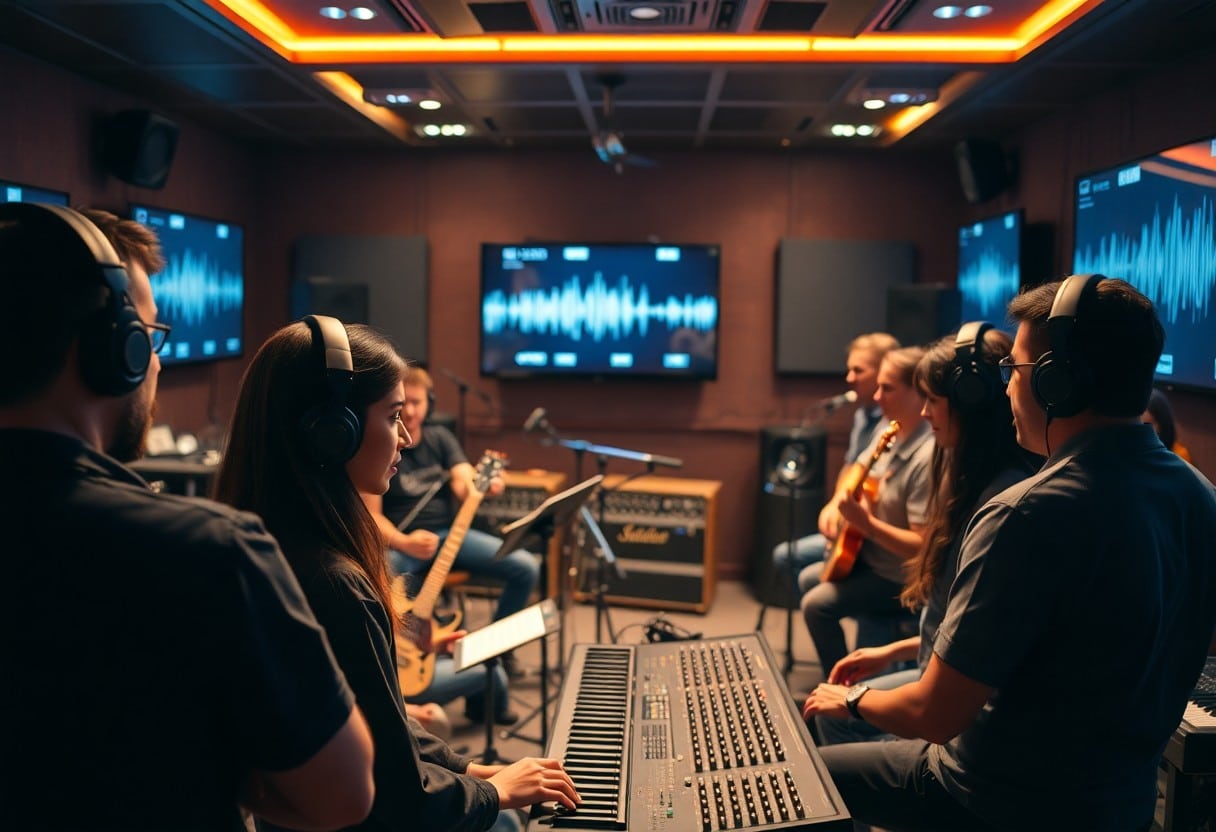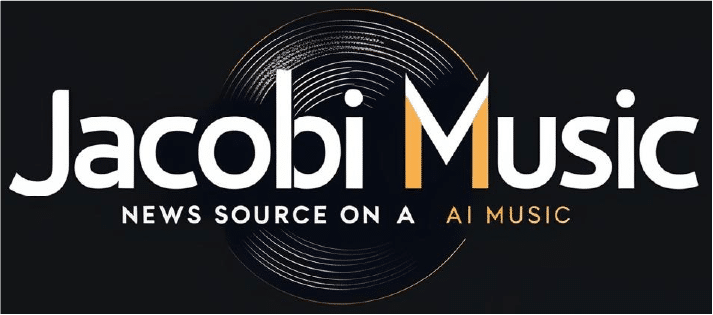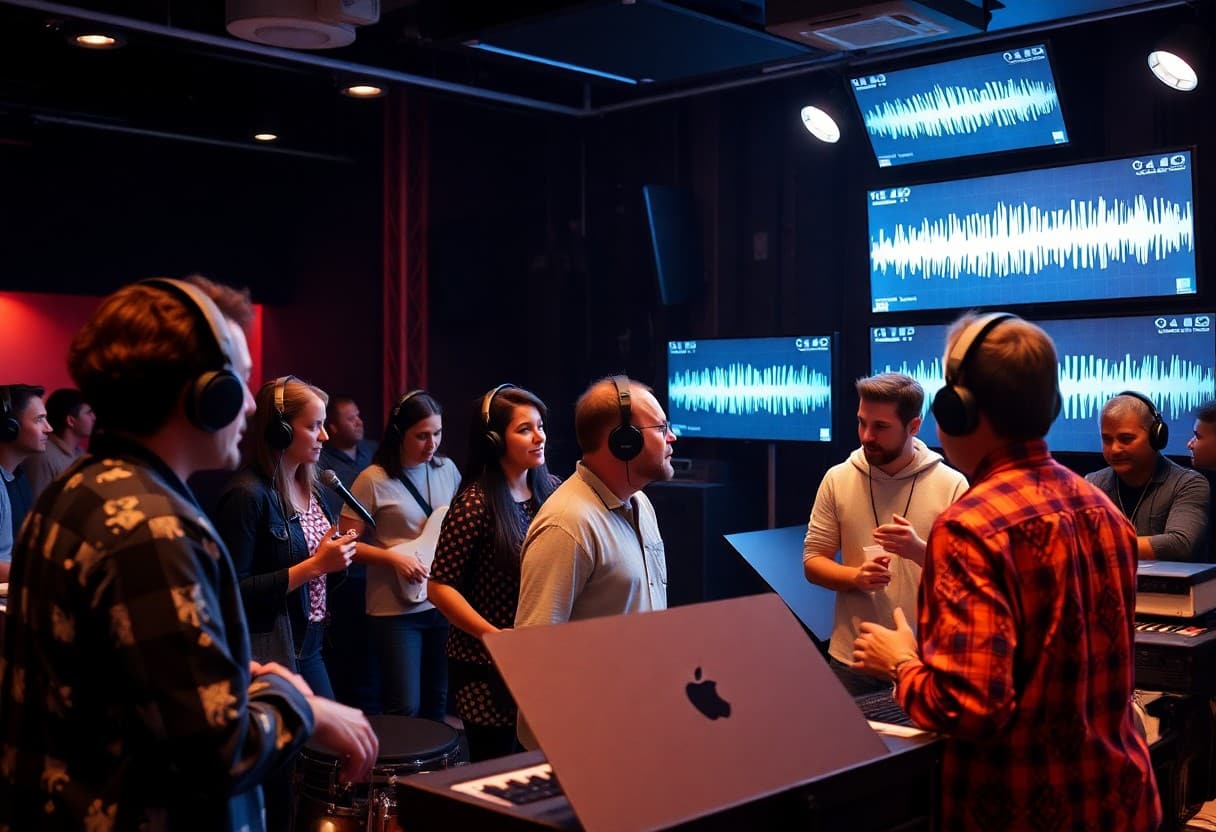You may be curious about how artificial intelligence is transforming the music experience in Clubhouse rooms. As I explore into the intersection of technology and creativity, I’ll explore how AI tools are enhancing music discovery, curation, and collaboration in this unique audio platform. With AI-driven features, you can find new sounds and connect with fellow music lovers in ways previously unimagined. Join me as I uncover the innovative ways AI is shaping our musical conversations in Clubhouse music rooms.
The Role of AI in Music Creation
AI has become a transformative tool in music creation, enabling artists to explore new avenues of creativity and unlock their full potential. By analyzing vast amounts of data, AI can emulate styles, generate innovative melodies, and assist in the overall music-making process. This fascinating integration not only streamlines tasks but also inspires musicians to venture into uncharted territories, merging technology with artistry.
AI-Powered Composition Tools
With the emergence of AI-powered composition tools, you can effortlessly generate unique musical pieces tailored to your preferences. These tools analyze genre characteristics and musical trends, offering suggestions that resonate with your style. By incorporating AI into your workflow, you can save time and enhance your creative output, allowing you to focus on honing your craft.
Enhancing Sound Quality and Mixing
Along with composition, AI also plays a pivotal role in enhancing sound quality and mixing. With advanced algorithms at its disposal, AI can help optimize the audio experience, ensuring that every element of your track sounds its best. By utilizing AI-driven mixing solutions, you’ll notice a significant improvement in clarity and depth, bringing your music to life.
Enhancing sound quality and mixing with AI tools allows you to achieve professional-grade results without extensive technical knowledge. These platforms can intelligently analyze individual tracks, identify issues, and provide recommendations for improvements. By automating tasks like equalization, compression, and reverb adjustments, you can achieve a polished sound effortlessly. As a result, AI makes the mixing process more accessible, empowering you to create captivating music that truly resonates with your audience.


AI in Music Recommendation Systems
While the landscape of music discovery continuously evolves, AI plays a significant role in transforming recommendation systems. These intelligent algorithms analyze your listening habits, preferences, and even social cues, creating a tailor-made auditory experience that resonates with individual tastes. By leveraging these technologies, I can help you uncover hidden gems and revisit personal classics, ultimately enhancing your musical journey within Clubhouse music rooms.
Personalizing User Experience
Any effective recommendation system must prioritize personalization. Based on your unique listening history, AI algorithms analyze your choices, giving you customized suggestions that align with your musical preferences. This level of personalization fosters a deeper connection to music, as you are more likely to explore songs that feel familiar yet refreshing, paving the way for enjoyable experiences in your Clubhouse interactions.
Leveraging Big Data for Better Choices
To gain an edge in music recommendation, AI systems utilize vast amounts of data from various sources. This data helps to identify trends, preferences, and even emerging genres that resonate with you. By leveraging this information, I can provide you with finely-tuned recommendations tailored to your specific needs and tastes, ultimately enhancing your musical experience on platforms like Clubhouse.
In fact, the power of big data allows AI algorithms to analyze millions of music tracks, user interactions, and social listening habits to build a comprehensive understanding of what appeals to you. By examining patterns across diverse demographics, these systems can better predict your preferences, ensuring that the music I recommend is not only relevant but also pushes the boundaries of your musical exploration. This data-driven approach elevates the music experience in Clubhouse, helping you discover artists and songs that you may have otherwise overlooked.
Collaboration Between Musicians and AI
Keep in mind that the synergy between musicians and AI is transforming the landscape of music creation. These collaborative efforts not only enhance creativity but also introduce innovative techniques that push artistic boundaries. By tapping into AI, musicians can explore new sounds, manipulate compositions, and engage with their audiences in previously unimaginable ways.
Co-Creation Processes
One fascinating aspect of this collaboration is the co-creation process that unfolds between artists and AI technologies. Musicians can input various parameters like genre, tempo, and mood, and the AI generates multiple variations of melodies or harmonies. This iterative process fosters an engaging environment where human intuition and AI’s computational capabilities complement each other, leading to unexpected and exciting musical results.
Case Studies of Successful Collaborations
An impressive array of successful collaborations highlights the potential of AI in music. Here’s a detailed list of notable partnerships:
- 1. *OpenAI’s Jukebox* – Generated over 300 songs from diverse genres and styles.
- 2. *Aiva Technologies* – Composed over 20,000 pieces for films, games, and commercials.
- 3. *Endlesss* – Launched a collaborative jamming platform with 5 million users sharing live sessions.
- 4. *IBM Watson Beat* – Assisted artists in creating custom tracks, resulting in a 25% increase in engagement for participating musicians.
Considering these case studies, I see tangible evidence of how AI can reshape the music-making experience. Each project illustrates that leveraging AI can lead to remarkable innovations, improving both engagement and productivity in the music industry. As I analyze the data and outcomes from these collaborations, it becomes evident that adopting AI not only enhances creativity but also fosters a community of musicians eager to collaborate and explore new horizons together.
The Impact of AI on Music Rooms in Clubhouse
All across Clubhouse, AI is reshaping how we experience music rooms. It streamlines the way we connect with artists, discover new sounds, and engage with one another. By leveraging AI algorithms, these music rooms can curate playlists tailored to individual preferences, enhancing the communal listening experience. Furthermore, AI-driven moderation tools improve the quality of interactions, ensuring that music lovers can enjoy a safe and harmonious environment. This innovative approach not only captivates users but also deepens their connection to the music itself.
User Engagement and Interactivity
One key aspect of AI’s influence in Clubhouse music rooms is the enhancement of user engagement and interactivity. With AI, users can participate in real-time polls, request songs, and even influence live performances through audience feedback. This dynamic interaction fosters a sense of community, as shared interests and preferences drive the musical experience. You may find yourself more immersed in the room, feeling like an active participant rather than just a listener.
The Evolution of Live Music Experiences
After implementing AI technology, the live music experience in Clubhouse has undergone remarkable transformations. Virtual performances now connect audiences from around the globe, making it possible for you to enjoy concerts without geographical barriers. AI not only personalizes musical selections but also learns your tastes over time, ensuring that each session feels uniquely crafted for your preferences. This evolution blurs the lines between performer and audience, creating a more intimate and engaging experience.
Another important aspect of this evolution is the integration of augmented reality (AR) and virtual reality (VR) elements powered by AI. As you engage in live music sessions, you might encounter immersive experiences that allow you to visualize music in ways never before possible. Furthermore, AI-driven analytics can help artists understand audience reactions in real-time, enabling them to adapt their performances instantly. This high degree of personalization and immersion heralds a new era where your musical journey is tailored to your tastes, making every session an unforgettable experience.
Ethical Considerations and Challenges
Many questions arise when integrating AI into Clubhouse music rooms. These include the implications for artists’ rights, the authenticity of AI-generated content, and the overall impact on the music industry. As we explore into this evolving landscape, it is vital to balance innovation with respect for human creativity and ethical standards.
Copyright Issues in AI-Generated Music
Above all, copyright considerations become increasingly complex when dealing with AI-generated music. As machines create compositions, determining ownership becomes challenging. You may find yourself questioning who holds the rights—the programmer, the user, or the AI itself? This murky territory necessitates a reevaluation of existing copyright laws to protect artists without stifling technological advancements.
The Role of Human Creativity
Ethical implications also emerge regarding the role human creativity plays alongside AI. While AI can generate impressive sounds and rhythms, it lacks the emotional depth and context that only humans can provide. I believe it’s vital for you to recognize that while AI can assist, it cannot replace the unique inspiration and intuition that characterizes human artistry.
Human creativity is irreplaceable in the music-making process. Even though AI can generate melodies, I firmly believe it is the human touch that adds emotion, cultural context, and personal narrative to music. You can think of AI as a complement to your creativity, aiding in exploration but never truly capturing the essence of what makes your music unique. Embracing this partnership is key to maintaining artistry in an increasingly automated world.
Future Trends in AI and Music Rooms
Now more than ever, AI is poised to redefine the landscape of music rooms on platforms like Clubhouse. As algorithms grow more sophisticated, I foresee an era characterized by personalized musical experiences that cater to individual tastes while fostering community engagement. Enhanced collaboration tools will not only facilitate real-time interaction between artists and fans but also inspire new genres and creative expressions. The potential for AI to serve as a co-creator in music sessions is rapidly coming to fruition, setting the stage for exciting possibilities ahead.
Emerging Technologies
Behind the scenes, technologies like machine learning and natural language processing are transforming the way we experience music in virtual spaces. These advancements enable AI to analyze user preferences and recommend songs, artists, and even activities during live music sessions. I find it fascinating how these emerging technologies will allow musicians to connect on a deeper level with their audience, creating a shared journey that transcends geographical boundaries.
Predictions for the Next Decade
Around the next decade, I anticipate that AI will become an integral part of music curation and creation within platforms like Clubhouse. This shift will likely lead to a democratization of music production, empowering aspiring artists to easily access tools that were once exclusive to established musicians. Additionally, I expect to see an increase in AI-generated music, which could inspire a new wave of collaborations and innovation in the industry.
In fact, the rise of AI will not only influence music creation but will also redefine the relationship between artists and audiences. I envisage immersive experiences where AI-driven environments adapt to user interactions, further enhancing the live music experience. As artists leverage AI in their creative processes, we can expect to see innovative fusion genres emerge, bridging gaps between different musical styles. The next decade promises to be an exhilarating journey into the transformative potential of AI in music rooms.
Conclusion
Summing up, I believe the integration of AI in Clubhouse music rooms can profoundly enhance your listening and engaging experience. By utilizing AI tools, you can discover new music tailored to your tastes and interact with artists and fellow listeners in novel ways. As we move forward, I encourage you to explore these innovations and see how they can elevate your time spent in Clubhouse. The future of music sharing and collaboration is exciting, and I can’t wait to see how you take part in it.

